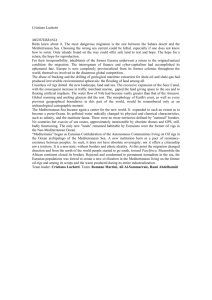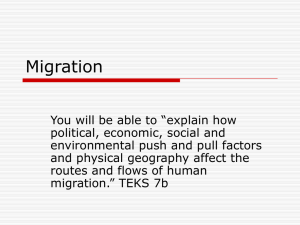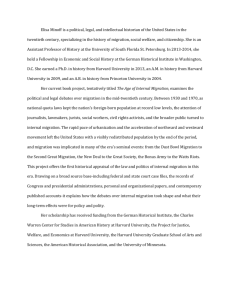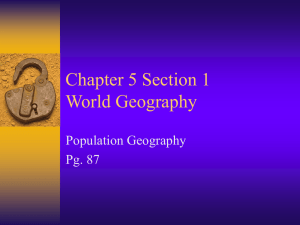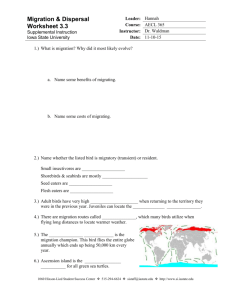Climate change, migration and corruption: the challenge for safety in
advertisement
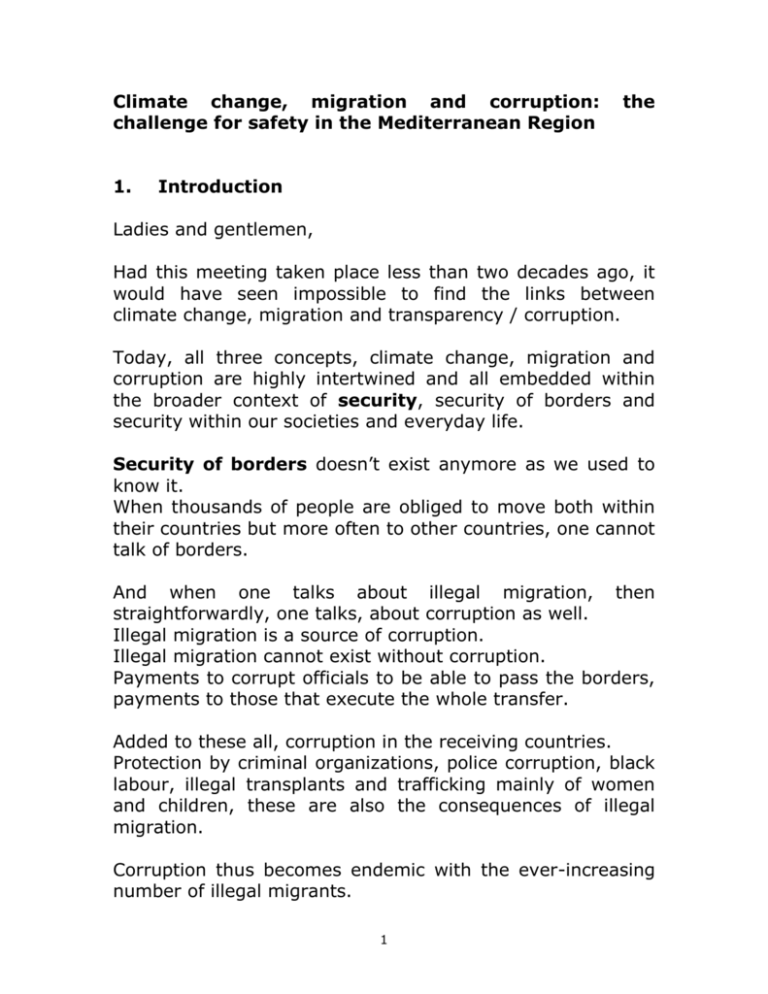
Climate change, migration and corruption: challenge for safety in the Mediterranean Region 1. the Introduction Ladies and gentlemen, Had this meeting taken place less than two decades ago, it would have seen impossible to find the links between climate change, migration and transparency / corruption. Today, all three concepts, climate change, migration and corruption are highly intertwined and all embedded within the broader context of security, security of borders and security within our societies and everyday life. Security of borders doesn’t exist anymore as we used to know it. When thousands of people are obliged to move both within their countries but more often to other countries, one cannot talk of borders. And when one talks about illegal migration, then straightforwardly, one talks, about corruption as well. Illegal migration is a source of corruption. Illegal migration cannot exist without corruption. Payments to corrupt officials to be able to pass the borders, payments to those that execute the whole transfer. Added to these all, corruption in the receiving countries. Protection by criminal organizations, police corruption, black labour, illegal transplants and trafficking mainly of women and children, these are also the consequences of illegal migration. Corruption thus becomes endemic with the ever-increasing number of illegal migrants. 1 2. Climate change and migration The whole notion of security cannot be envisaged any more in traditional terms. Resource scarcity, greater environmental degradation, decline of arable land, do represent a source of conflict and are prior causes for cross-border tensions. Such phenomena are enhanced by ever increasing climate change. Climate change has emerged as a serious security issue across the agenda with drought driven conflicts in Africa and water driven conflicts in Middle East. As the situation deteriorates such conflicts will most likely multiply. Environmental Refugees, a London-based foundation, has stated in one of their reports that there is a growing interdependency in a world where environmental problems have no respect for borders. This development is a direct result of the new reality that we face, namely the crisis is growing and more and more it seems unavoidable. The number of people around the world uprooted for environmental reasons probably totals 25 million, compared with 22 million displaced by civil wars and persecution. By 2050, there could be 150 million people worldwide "displaced by a cocktail of ecological 'push factors'". Africa and Middle East bordering on the Mediterranean, are most vulnerable to climate change through droughts in North Africa, water scarcity and land overuse, soil degradation and loss of arable land. The Nile Delta is also a risk-prone area. Water systems in the Middle East are under stress and they depend on external water resources. 2 Significant reductions in yields are also expected in this vital strategic region. Further political instability is expected with detrimental implications for Europe’s energy security. Climate induced migration will be a major factor of instability and tension in the Mediterranean basin for the foreseeable future. It is safe to predict that corruption on both sides of the Mediterranean will also increase as a direct result of these developments. 3 3. Delivering climate security The global community is at risk if we fail to address the threats resulting from/ climate change, including migration. If we fail to undercut the vicious circle resulting from climate change that leads to the reduction in natural resources, increased conflicts, massive migration, instability, corruption. If we fail to stop polluting, we will be subject to catastrophic changes over the next century which will directly displace hundreds of millions of people and undermine the livelihoods of others. Hence, addressing security in broader terms, means delivering climate security. Climate change and our responses to it, will frame the security context in the coming decades. Climate change fallout will further weaken and even increase weak political institutions. And as we well know, weak political institutions mean less transparency and more corruption. Climate change is a threat multiplier to existing trends and tensions. According to the Center for Strategic and International Studies in the US, scarcity of resources may dictate the terms of international relations for the years to come. If this is so, I suspect that scarcity of resources and the resulting implications, including illegal migration, will lead to levels of corruption that we have rarely seen in our societies in the post war years. 4 4. Policy implications There are seven policy parameters that need to be taken into consideration in addressing climate change and migration and corruption 1. In addition to practical implications, there are also ethical dimensions to the link between climate change and migration. Citizens of less industrialized countries are going to suffer disproportionately from the effects. 2. Climate security, reduced migration and hence reduced corruption is a vital issue for the well-being of our societies and we should not delay action for avoiding immediate costs. 3. There is a need for more direct and interventionist action to prevent climate risks and migration. We should be prepared for the worst case scenario. 4. Climate change will require a “low carbon”, a “green” economy which will lower tensions over fossil fuel reserves. 5. People forced to flee by climate change deserve recognition as refugees. The Geneva Convention should be changed to protect everyone who is forced to flee by environmental damage. Apart from the obvious human rights related issue, the recognition of such migrants as refugees will remove a major factor in the vicious cycle of “climate change- environmental refugees –illegal activities and corruption” 6. Fragile governance systems, especially in Africa, are overwhelmed by the social stresses released by drought, famine, flood, migration, extreme weather events and rising sea levels. Corruption that was endemic becomes even more so. 5 7. Climate adaptation is not only a technical issue. It is a highly political one which will require complex diplomatic intervention in difficult and highly charged resource management issues over land and water. 6 5. The role of the EU There are many reasons for struggling to change the course of climate change. The issue of security at its broader context is also a reason. Because migration represents a tremendous force of social change, the potential for climate change to increase migration deserves careful consideration and policy attention. The Barcelona process – initiated at EU level in 1995 – has framed the Mediterranean policy of the EU. It has been precisely created to address the issue of migration and stability in the region through the provision of funds and mechanisms for the economic development of the southern part of the Mediterranean. At that time, climate change was not at the forefront. Now, with climate change a main priority, we have every reason to rejuvenate such policies. The EU and the Mediterranean region should provide greater conflict prevention capabilities. More environmental diplomacy and cooperation with countries likely to be more affected by climate change. (The Green Diplomacy Network). Policies to reduce climate-related migration need not be climate-specific, but could serve to enhance families' livelihood options. In this way, development efforts and programs to reduce poverty will lessen livelihood vulnerability, ultimately reducing the need for families to migrate because of climate change. Intensify EU capacities in monitoring and early warning for migration waves. Further work to region by region to see in depth the security implications for every single region. 7 Multilateral security. leadership in addressing global climate The international financial crisis that we all face should not be seen as an obstacle to the funding of such policies, to the transparent funding of the areas which are more susceptible to climate change impacts. The economic crisis should not make our societies more closed and more hostile to new entries. If we cannot find altruistic reasons to assist the citizens of nations that contribute to illegal migration, we should do that by selfish reasons. 8

